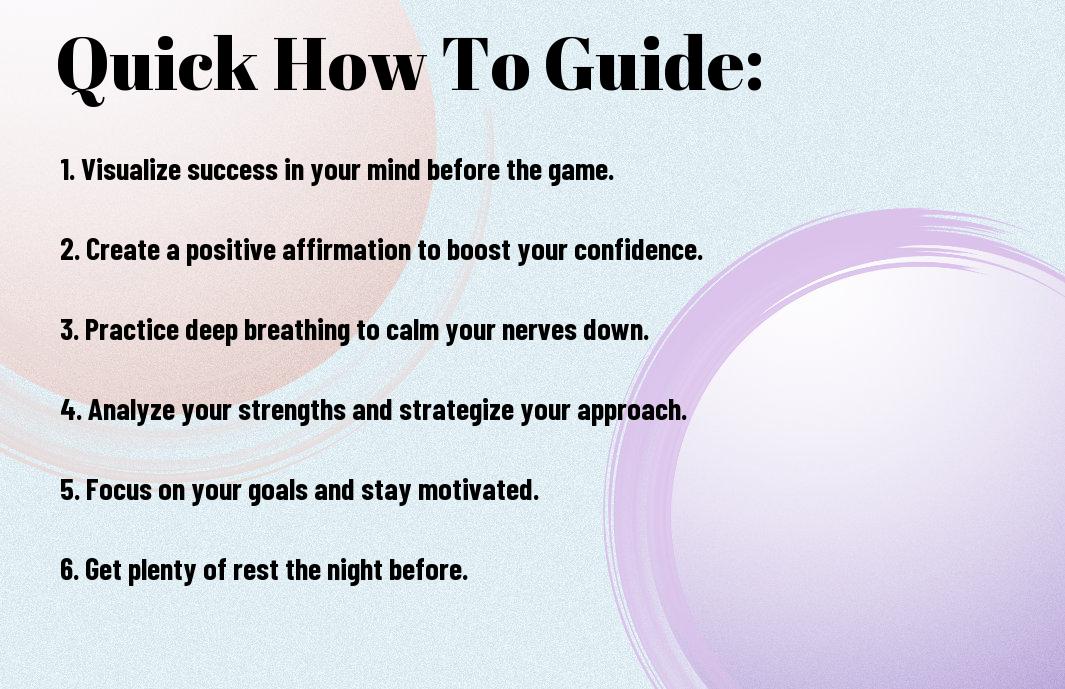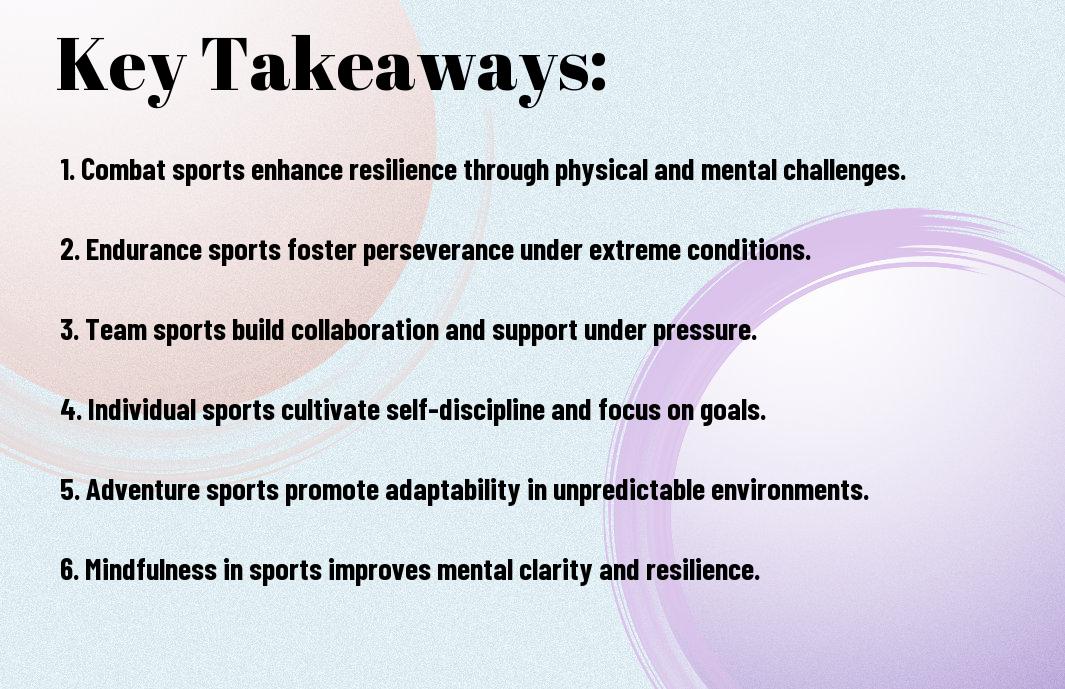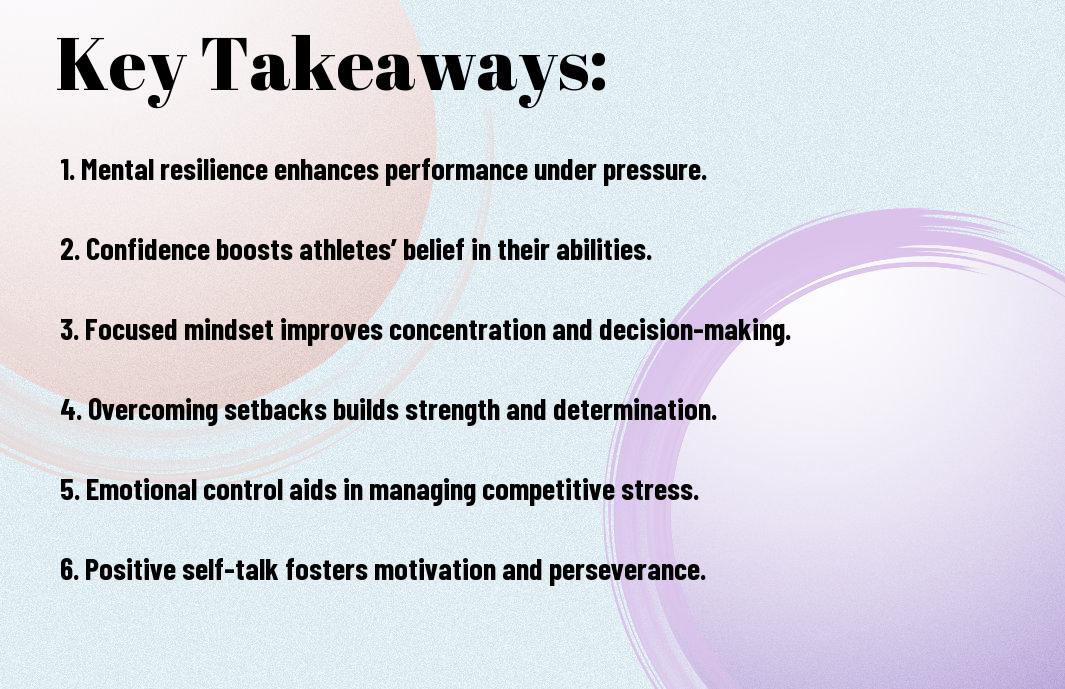You may not realize it, but engaging in sports can significantly enhance your mental well-being. Physical activity stimulates the release of endorphins, which promote feelings of happiness and reduce stress. Additionally, being part of a team fosters social connections and a sense of belonging, both of which are important for emotional health. This blog post will explore various mental health benefits that come from playing sports and offer insights on how you can incorporate more athletic activities into your life for a healthier mind.
Key Takeaways:
- Improved Mood: Engaging in sports can lead to the release of endorphins, which are natural mood lifters that combat feelings of anxiety and depression.
- Social Connection: Playing sports fosters teamwork and camaraderie, helping individuals build relationships and improve their sense of belonging.
- Stress Relief: Physical activity in sports acts as a natural stress reliever, helping to reduce cortisol levels and promote relaxation.
- Enhanced Self-Esteem: The achievements and progress made in sports can boost confidence and self-worth, contributing to a more positive self-image.
- Cognitive Benefits: Participation in sports has been linked to improved focus, discipline, and motivation, benefiting overall mental clarity and performance.
The Psychological Impact of Sports
A vast array of research highlights the psychological benefits of participating in sports. Engaging in physical activity not only enhances your physical fitness but also significantly improves your mental well-being. Whether you’re playing competitively or casually, the camaraderie and discipline involved can create a positive coping mechanism for the challenges of daily life. You may find that sports have the power to elevate your mood, reduce anxiety, and foster a sense of belonging, ultimately leading to a healthier mindset.
Stress Reduction
To combat daily stressors, engaging in sports provides an effective outlet. Physical activity triggers the release of endorphins and other chemicals that help alleviate tension and promote relaxation. When you immerse yourself in athletic pursuits, your focus shifts away from daily worries, allowing you to manage stress levels more effectively. It’s an opportunity to channel your energy into something positive, which can lead to a notable decrease in overall stress and anxiety.
Enhanced Mood and Well-being
Along with reducing stress, participating in sports can significantly enhance your mood and overall sense of well-being. Regular engagement in physical activity stimulates the production of neurotransmitters like serotonin, which play a vital role in regulating mood. This can help alleviate symptoms of depression and improve your outlook on life. You may notice that the structured nature of sports allows you to set and achieve goals, fostering a sense of accomplishment and self-worth.
And as you incorporate more sports into your routine, you’ll likely experience a gratifying boost in confidence and self-esteem. The social interactions you encounter while playing help forge connections with others, further enhancing your mood. Being part of a team or a community fosters a sense of belonging, contributing to your overall happiness. Ultimately, you’ll discover that the mental health benefits of participating in sports extend far beyond just physical fitness, offering you a joyful and fulfilling outlet for emotional expression.
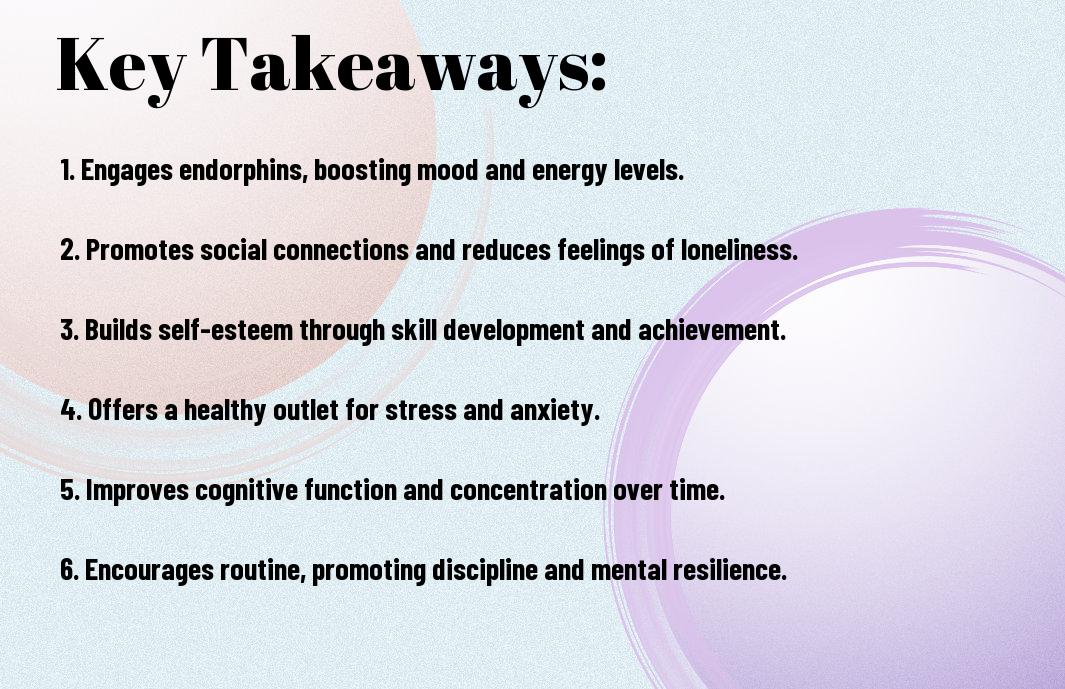
Social Connections Through Sports
It is well known that engaging in sports can provide you with meaningful social connections. Participating in a team or community sport offers you the opportunity to meet new people, form friendships, and develop a sense of belonging, which can significantly enhance your mental well-being. The shared experiences and camaraderie found in sports foster a supportive environment, encouraging you to connect with others who share similar passions and goals.
Building Relationships
Social interactions in sports pave the way for new friendships and relationships that can extend beyond the playing field. By participating in team activities, you create bonds with others who share your commitment and passion, making it easier to forge connections based on mutual interests and experiences.
Team Dynamics and Support
For individuals, team sports can provide a supportive network that enhances your experience and well-being. The camaraderie built through shared goals reinforces your sense of belonging, while positive interactions can uplift and motivate you both on and off the field.
To make the most of team dynamics, focus on communication and collaboration. Each member contributes unique strengths and perspectives, creating an environment where everyone feels valued. This mutual support not only aids in skill development but also fosters resilience, allowing you to navigate challenges together. As you build strong relationships and rely on your teammates, you’ll experience increased motivation and accountability, ultimately enhancing the overall enjoyment and success of your sporting endeavors.
The Role of Physical Activity in Mental Health
Unlike sedentary lifestyles, engaging in physical activity can significantly enhance your mental well-being. Regular involvement in sports not only promotes physical health but also fosters emotional resilience, boosts self-esteem, and alleviates anxiety and depression. This holistic approach to fitness provides a powerful outlet, helping you build connections with others and face daily stresses more effectively.
Neurotransmitter Release
One of the key reasons physical activity elevates your mental health is through the release of neurotransmitters, particularly endorphins. These natural chemicals are released during exercise, promoting feelings of happiness and euphoria. This phenomenon, often referred to as the “runner’s high,” can help mitigate feelings of stress, sadness, and anxiety, allowing you to experience a more positive outlook on life.
Long-term Mental Health Benefits
Between regular participation in sports and sustained mental health improvements, evidence suggests a strong link. Engaging in physical activities promotes consistency, which leads to reduced levels of anxiety and depression over time. As you make sport a priority in your life, you are likely to reap the benefits of improved mood regulation, enhanced cognitive function, and increased social connections.
Also, long-term engagement in sports can lead to improved coping mechanisms, as you begin to associate physical activity with a positive mental state. By regularly participating in sports, you create a routine that bolsters your resilience against stressors, nurtures healthy relationships, and enhances overall life satisfaction. This commitment to physical activity can serve as a powerful preventative measure against mental health challenges you may encounter throughout life.
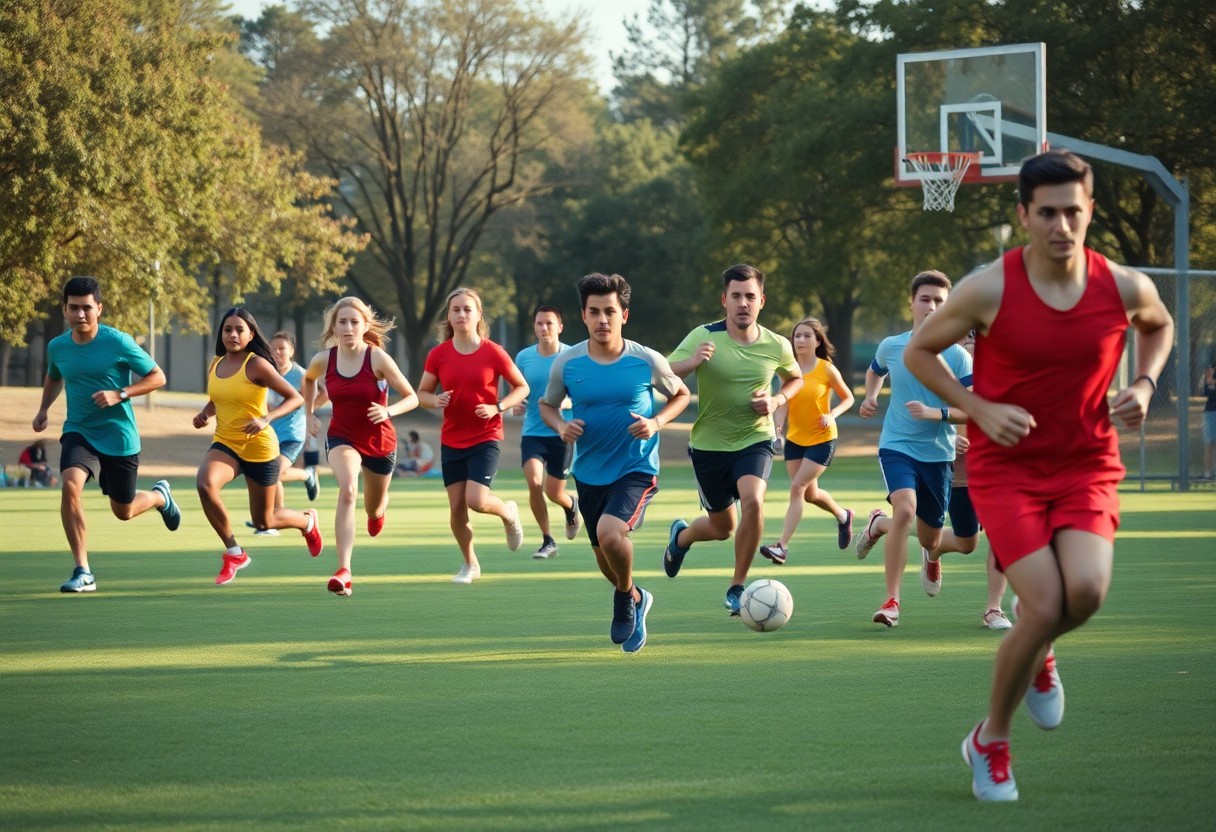
Sports as a Coping Mechanism
Once again, engaging in sports serves as a powerful coping mechanism for managing emotional struggles. Regular participation in physical activities allows you to relieve stress and regulate your mood, as highlighted by the research on Physical Exercise and Mental Health: The Routes of a …. Through sports, you can channel your feelings into something productive and uplifting, transforming potential anxiety or frustration into energy and motivation.
Resilience Building
Coping through sports helps you build resilience, enabling you to bounce back from setbacks. When you face challenges in athletic pursuits, whether it’s overcoming a tough opponent or pushing through fatigue, you develop a mindset that is vital for handling life’s difficulties. This fortitude gained from sports translates into greater emotional strength when addressing personal or professional obstacles.
Distraction from Daily Stressors
Behind every moment on the field or court, you will find an opportunity to escape the pressures of daily life. Engaging in sports provides you with a welcomed distraction that temporarily shifts your focus away from stressors, such as work or personal challenges. As you immerse yourself in the game, you foster a sense of presence that allows you to recharge and recharge your mental wellbeing.
At times, the demands of daily life can become overwhelming, leading to burnout or anxiety. When you investigate sports, you step away from these pressures, allowing yourself to concentrate solely on the activity at hand. This temporary reprieve not only lifts your spirits but also provides a mental reset, enabling you to return to everyday challenges with increased clarity and resilience.
Inclusion and Diversity in Sports
Keep in mind that the inclusion of diverse groups in sports not only enhances the experience for all participants but also fosters a sense of belonging. When people from various backgrounds come together, they contribute unique perspectives and skills, enriching the team dynamic. This diversity can help challenge stereotypes and promote empathy, ensuring that everyone feels valued and empowered on and off the field.
Mental Health Benefits for Marginalized Groups
Below are some significant mental health benefits for marginalized groups participating in sports. Engaging in physical activities provides you a space to connect with others who may share similar experiences, creating camaraderie and understanding. Feeling part of a team can boost your self-esteem and help combat feelings of isolation, making sports an effective outlet for mental health support.
Fostering Community and Support
After participating in sports, you often find yourself surrounded by a network of individuals who uplift and encourage you. This collective environment fosters community and emotional support, which is important for mental well-being. Engaging in sports creates opportunities for meaningful connections, allowing you to share challenges and victories with teammates, thus strengthening bonds and enhancing overall mental health.
Benefits of fostering community and support through sports extend beyond mere friendships. Being part of a team helps you develop strong social networks that can provide emotional and psychological aid during tough times. The shared goals and teamwork cultivate a sense of belonging that is invaluable, reinforcing your mental resilience. In this supportive atmosphere, you are more likely to thrive and overcome personal challenges, making sports a vital resource for enhancing your mental health.
Case Studies and Personal Narratives
Your understanding of the mental health benefits of sports can be enriched by examining several compelling case studies and personal narratives. Consider the following examples:
- Case Study 1: A 30% decrease in anxiety levels in participants regularly engaged in team sports.
- Case Study 2: An 80% improvement in mood and feelings of self-worth reported by adolescent athletes over a six-month period.
- Case Study 3: A significant 50% reduction in symptoms of depression observed in individuals participating in weekly physical activities.
Success Stories
Any story related to sports and mental health can inspire you. For instance, a college soccer player battled severe depression and found that consistent practice not only strengthened her game but also lifted her spirits, leading to a drastic improvement in her mental well-being.
The Impact of Sports on Overall Mental Health
One notable aspect is that participating in sports fosters a sense of community and belonging, which can greatly enhance your mental health. Sports can serve as an outlet to process emotions, reduce stress, and improve your overall outlook on life.
Impact studies reveal that individuals engaged in regular physical activity are less prone to anxiety and depression. Research indicates a direct correlation between sports participation and enhanced cognitive function, improved self-esteem, and a lower incidence of mental health disorders. As you engage in sports, you are likely to find not only physical benefits but also a supportive environment that fosters emotional resilience.
Summing Up
So, engaging in sports can significantly enhance your mental health by reducing stress, improving mood, and boosting self-esteem. The combination of physical activity and social interaction creates a positive atmosphere that can elevate your overall well-being. You’ll find that regularly participating in sports not only helps you stay fit but also cultivates resilience, focus, and a sense of community. Incorporating sports into your routine can be a powerful tool for maintaining and improving your mental health.
Q: How does playing sports improve mental health?
A: Engaging in sports is known to have various positive impacts on mental health. Firstly, physical activity releases endorphins, often referred to as “feel-good hormones,” which can help alleviate feelings of stress and anxiety. Moreover, participating in team sports fosters social connections, reducing feelings of loneliness and promoting a sense of belonging. This social interaction is particularly beneficial for emotional well-being, enhancing self-esteem and creating supportive networks among teammates.
Q: Can playing sports help with depression?
A: Yes, playing sports can significantly aid in managing symptoms of depression. Physical activity stimulates the production of neurotransmitters like serotonin and dopamine, which are key in regulating mood. Regular participation in sports can create a routine and a sense of achievement, which can counteract depressive symptoms. Additionally, being part of a sports team provides social support, which is vital in improving overall mental health and mitigating feelings of isolation often associated with depression.
Q: What types of sports are most beneficial for mental wellness?
A: While any form of physical activity can contribute to mental wellness, sports that promote regular social interaction and physical engagement tend to have the most benefits. Team sports such as soccer, basketball, and volleyball encourage cooperation and social bonding, while individual sports like running, tennis, or swimming can also enhance mental health through personal goal-setting and achievement. Ultimately, the best choice depends on individual preference, as enjoying the activity can lead to more consistent participation and better mental health outcomes.
